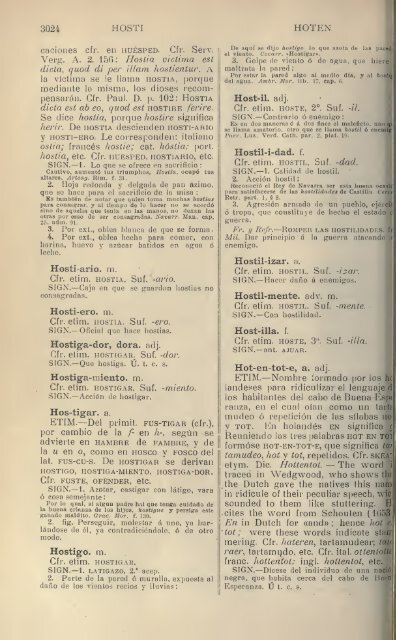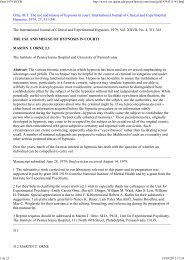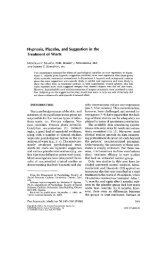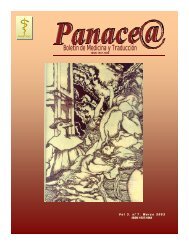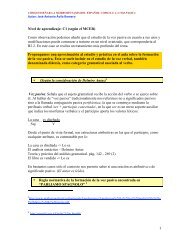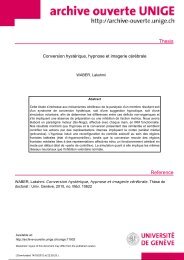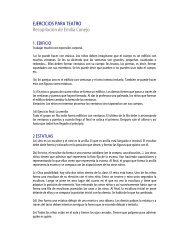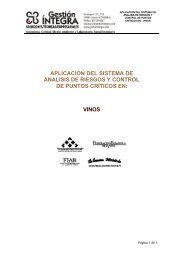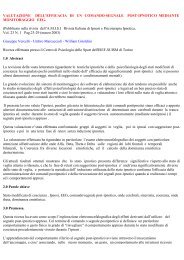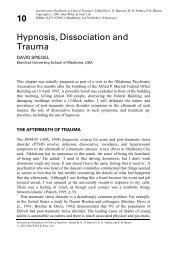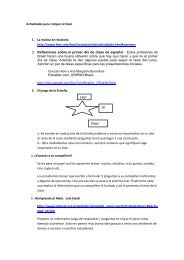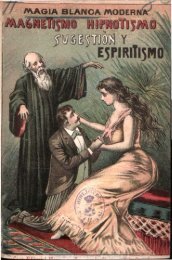Diccionario filológico-comparado de la lengua castellana
Diccionario filológico-comparado de la lengua castellana
Diccionario filológico-comparado de la lengua castellana
You also want an ePaper? Increase the reach of your titles
YUMPU automatically turns print PDFs into web optimized ePapers that Google loves.
3024 HOSTI HOTEN<br />
caciones cfr. en huésped. Cfr. Serv.<br />
Verg. A. 2. 156: Hostia victima est<br />
dicta, quod di per il<strong>la</strong>tn hostientur. a<br />
<strong>la</strong> víctima se !e l<strong>la</strong>ma hostia, porque<br />
mediante <strong>la</strong> misma, los dioses recompensarán.<br />
Cfr. Paul. D. p. 102: Hostia<br />
dicta est ab eo, quod est hostire ferire.<br />
Se dice hostia, porque Jiostire sií^nifica<br />
herir. De hostia <strong>de</strong>scien<strong>de</strong>n iiosti-ario<br />
y HOSTi-ERO. Le correspon<strong>de</strong>n: italiano<br />
ostia; francés hostie; cat. hostia; port.<br />
hostia, etc. Cfr. huésped, hostiario, etc.<br />
SIGN.— 1. Lo que se ofrece en sacrificio :<br />
Cautivo, aumentó tus triumplios. Hostia, ocupó tus<br />
altares. Arteag. Rim. f. 31.<br />
2. Hoja redonda y <strong>de</strong>lgada <strong>de</strong> pan ázimo,<br />
que se hace pora el sacrificio <strong>de</strong> <strong>la</strong> misa :<br />
Es también <strong>de</strong> notar que quien toma muchas hostias<br />
para consagrar, y al tiempo <strong>de</strong> lo hacer no se acordó<br />
sino <strong>de</strong> aquelia que tenia en <strong>la</strong>s manos, no rtexan <strong>la</strong>s<br />
otras por esso <strong>de</strong> ser consagradas. Navarr. Man. cap,<br />
25. núm. 91.<br />
3. Por ext., oblea b<strong>la</strong>nca <strong>de</strong> que se forma.<br />
4. Por ext., oblea hecha para comer, con<br />
harina, huevo y azúcar batidos en agua ó<br />
leche.<br />
Hosti-ario. m.<br />
Cfr. etim. hostia. Suf. -ario.<br />
SIGN,—Caja en que se guardan hostias no<br />
consagradas.<br />
Hosti-ero. m.<br />
Cfr. etim. hostia. Suf. -e/-o.<br />
SIGN.— Oficial que hace hostias.<br />
Hostiga- dor, dora. adj.<br />
Cfr. etim. hostigar. Suf. -dor.<br />
SIGN.— Que hostiga. Ú. t. c. s.<br />
Hostiga-miento. m.<br />
Cfr. etim. hostigar, Suf. -miento.<br />
SIGN.— Acción <strong>de</strong> hostigar.<br />
Hos-tigar. a.<br />
ETIM.— Del primit. fus-tigar (cfr.),<br />
por cambio <strong>de</strong> ¡a /- en h-, se^^ún se<br />
advierte en hambre <strong>de</strong> fambre, y <strong>de</strong><br />
<strong>la</strong> u en o, como en hosco y fosco <strong>de</strong>l<br />
<strong>la</strong>t. Fus-cu-s. De hostigar se <strong>de</strong>rivan<br />
hostigo, hostiga-miento, hostiga-dor.<br />
Cfr. FUSTE, ofen<strong>de</strong>r, etc.<br />
SIGN.— 1. Azotar^ castigar con látigo, vara<br />
ó cosa semejante<br />
Por lo qual, si algún padre hai que tenga cuidado <strong>de</strong><br />
<strong>la</strong> buena crianza <strong>de</strong> los hijos, hostigue y persiga este<br />
ganado maldito. Grac. Mor. f. ],30.<br />
2. fig. Perseguir, molestar á uno, ya burlándose<br />
<strong>de</strong> él, ya contradiciéndole, ó <strong>de</strong> otro<br />
modo.<br />
Hostigo, m.<br />
Cfr. etim. hostigar,<br />
SIGN.— 1, LATIGAZO, 2.' acep.<br />
2. Parte <strong>de</strong> <strong>la</strong> pared ó mural<strong>la</strong>, expuesta al<br />
daño <strong>de</strong> los vientos recios y lluvias:<br />
De aquí se dijo hostigo lo que azota <strong>de</strong> <strong>la</strong>s pared<br />
el viento. (Jovarr. «Hostigar».<br />
3. Golpe <strong>de</strong> viento ó <strong>de</strong> agua, que hiere<br />
maltrata <strong>la</strong> pared:<br />
Por estar <strong>la</strong> pared algo al medio día, y al ftoí/<br />
<strong>de</strong>l agua. Ambr. Mor. lib. 17, cap. (i.<br />
Host-il. adj.<br />
Cfr. etim. hoste, 2°. Suf. -//.<br />
SIGN. — Contrario ó enemigo :<br />
Es en dos maneras ó k dos fines el maleficio, uno (j<br />
se l<strong>la</strong>ma amatorio, otro que se l<strong>la</strong>ma hostil ó enemit<br />
Parr. Luz. Verd. Cath. par. 2, p<strong>la</strong>t. 19.<br />
Hostil-i-dad. f.<br />
Cfr. etim. hostil. Suf. -dad.<br />
SIGN.— 1. Calidad <strong>de</strong> hostil.<br />
2, Acción hostil:<br />
Reconoció el Rey <strong>de</strong> Navarra ser esta buena ocai<br />
para satisfacerse <strong>de</strong> <strong>la</strong>s hostilida<strong>de</strong>s <strong>de</strong> Castil<strong>la</strong> C'er<br />
Retr. part. ], § 8.<br />
3. Agresión armada <strong>de</strong> un pueblo, ejércit<br />
ó tropa, que constituye <strong>de</strong> hecho el estado d<br />
guerra.<br />
Fr. !/ /?í/r.—Romper <strong>la</strong>s hostilida<strong>de</strong>s, fi<br />
MU. Dar principio á <strong>la</strong> guerra atacando<br />
enemigo.<br />
Hostil-izar. a.<br />
Cfr. etim. hostil. Suf. -i::ar.<br />
SIGN.— Hacer daño á enemigos.<br />
Hostil-mente. adv. m.<br />
Cfr. etim. hostil. Suf. -mente.<br />
SIGN.— Con hostilidad.<br />
Host-il<strong>la</strong>. f.<br />
Cfr. etim. hoste, 3". Suf. -i/<strong>la</strong>.<br />
SIGN. — ant. ajuar.<br />
Hot-en-tot-e, a. adj.<br />
ETIM.—Nombre íormado {)or los h(<br />
<strong>la</strong>n<strong>de</strong>ses para ridiculizar el <strong>lengua</strong>je d<br />
los habitantes <strong>de</strong>l cabo <strong>de</strong> Buena Esp(<br />
ranza, en el cual oían como un tartí<br />
mu<strong>de</strong>o ó repetición <strong>de</strong> <strong>la</strong>s sí<strong>la</strong>bas ho<br />
y TOT. Kn ho<strong>la</strong>ndés en significa í<br />
Reuniendo <strong>la</strong>s tres pa<strong>la</strong>bras hot en tot<br />
formóse hot-en-tot-e, que significa tai<br />
tamu<strong>de</strong>o, hot y tot, repetidos. Cfr. skea";<br />
etym. Dic. Hottentot. — The word i<br />
traced in Wedgwood, who shows tht<br />
the Dutch gave the natives this natn<br />
in ridicule of their peculiar speech, vvic<br />
soun<strong>de</strong>d to them like stuttering. H<br />
cites the word from Schoulen (1653<br />
En in Dutch for «and»; henee hot e,<br />
tot ; were these words indícate stajOG<br />
mering. Cfr. hateren, tartamu<strong>de</strong>ar; td^j^<br />
raer, tartamiido, etc. Cfr. ital. ottento<br />
franc. hottentot; ingl. hottentot, ele.<br />
SIGN.— Dícese <strong>de</strong>l individuo <strong>de</strong> una nació<br />
negra, que habita cerca <strong>de</strong>l cabo <strong>de</strong> Bu0D<br />
Esperanza. Ú t. c. s.


